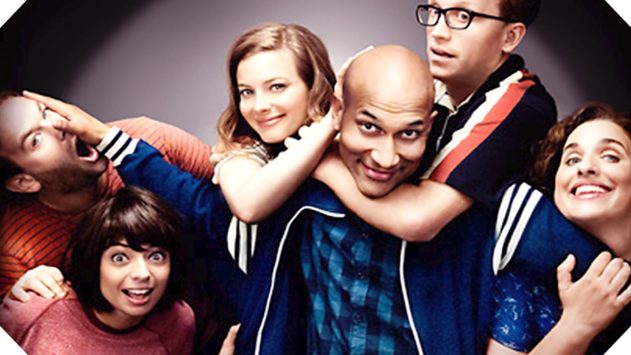Tami Sagher’s choice not to make Lindsay the “self-conscious fat girl” seems almost revolutionary, particularly in the world of comedy, where most women comics who lack film or television deals are invisible—and fat women are so often the butt of the joke.
After seeing Mike Birbiglia’s new movie Don’t Think Twice, I can’t stop talking about how great it is. But the character who left the deepest impression on me was Lindsay, played by Inside Amy Schumer and Girls writer Tami Sagher. In the ensemble cast of improv actors, which counts Keegan-Michael Key and Gillian Jacobs among its most prominent leads, Sagher shines as Lindsay: a mid-30s unemployed pot-smoking comedian who also subscribes to therapy-twice-a-week, lives with her parents in the Upper West Side of New York, and struggles to match the competitive ambition of her peers in The Commune improv troupe.
But what’s especially remarkable about Lindsay? She’s fat. And it’s never brought up. Not by her friends, not by her improv audiences, not even by her own admission. Because Lindsay is carefully crafted as a woman who does not deconstruct her thoughts on fat for other people’s feedback, the audience doesn’t have to think twice about this particular topic.
I can’t think of another recent movie where a fat woman got to be fat without the film making her existence into a sad, self-pitying, obnoxious, winking, cautionary, FATTY IS FUNNY commentary.
In just 92 minutes, a fat female character’s body takes up space on-screen without being reduced to punchline or pathology. There’s no scene of “why I eat my emotions,” or crass jokes from her friends about Lindsay’s weight, or chairs breaking, or any of the other embarrassing, one-note stereotypes about fat women so often portrayed in contemporary films. Best of all, Lindsay isn’t unfuckable or insecure or self-deprecating. She’s got a lot more going for her than that.
This ideal of Fat Woman As Human Being is underscored most emphatically in the moment when Miles (Birbiglia) says “fuck you” to Lindsay after he realizes that she’s the only member of The Commune who was offered a writing job on Weekend Live (the movie’s stand-in for SNL). But in response, Lindsay doesn’t pout about how she’s too “ugly” or “big.” She doesn’t cry. She coolly appraises the bitterness in her friend’s voice and says, “I wouldn’t. I’m not 22 and I’m not one of your students.” And then she walks off.
In that moment—and all throughout Don’t Think Twice—Lindsay is a feminist badass who gets to succeed as a performer and isn’t required to lay bare her body issues. She’s a fat woman on-screen who gets to be other things, too. She’s stammering and awkward in the presence of Ben Stiller. In therapy, she’s self-aware and ashamed of her upper-class background. She’s silly and serious: She’s the first one to offer a ride to Philadelphia when a friend’s dad goes to the hospital, and she also knows her way around a bong.
Sagher’s choice not to make Lindsay the “self-conscious fat girl” seems almost revolutionary, particularly in the world of comedy, where most women comics who lack film or television deals are invisible—and fat women are so often the butt of the joke.
In the Lenny essay “Anorexic Alice and Her Fat Former Friend,” Sagher describes herself as “five-foot-five inches, overweight, yes, but nevertheless a supposedly average American—I couldn’t find a pair of jeans for all the diuretic tea in China.” She describes binge-eating and having a relationship to food that serves as “an Infinite Yes.” I don’t know what’s changed for Sagher since the period of time she describes in that essay. I’m not sure I need to know. But through her writing and acting, it’s clear that Sagher is comfortable in her skin, whether she’s writing about the realities of being a fat woman in L.A. or playing the kind of woman on-screen who won’t underline the inherent differences of her body vs. those of her castmates.
So much of this movie resonated with me as a writer, feminist, and pop-culture fanatic. I ached when Samantha (Jacobs) chickened out on her own audition for Weekend Live. In my eyes, everything that happens to her after that moment is a tragedy, one borne of her own refusal to make the leap, to risk failure, to try. Later, I shook my head when Jack (Key) claims that “improv doesn’t go on forever.” You could say the same thing about sketch comedy TV shows. I wanted to talk to these characters, share a coffee with them, listen to their jokes and ideas for new comedy projects. Birbiglia’s gift for dialogue makes all of these people real and achingly human.
But in the depiction of Lindsay—the fat girl who succeeds as a writer and entertainer without ever once making the audience feel sorry for her—Birbiglia and Sagher have created a character who is nothing less than a triumph of feminist filmmaking.
Allison McCarthy is a writer with a focus on personal essays, intersectional feminism and social justice. Her work has been featured in print and online publications such as The Washington Post, The Guardian (U.K.), AlterNet, The Establishment, Vox, Time.com, xoJane, DAME, Autostraddle, Ravishly, The Frisky, Medium.com (“Human Parts” series), Bitch,make/shift, Ms. (blog), Girlistic, YourTango, Hip Mama, Bustle, Global Comment, Role/Reboot, Shameless, The Feminist Wire, ColorsNW, The Baltimore Review and Hoax, as well as in several anthologies. A graduate of Goucher College and the Master of Professional Writing program at Chatham University, she currently lives in Maryland.
Other Links:

